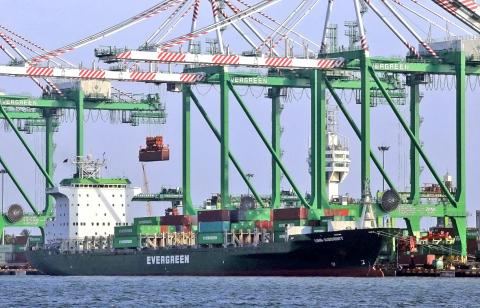The value of export orders dropped for a fourth straight month last month, and is expected to decline again this month, the Ministry of Economic Affairs said yesterday.
Export orders last month contracted 5 percent to US$36.29 billion from a year ago, with total orders in the first seven months of this year reaching US$253.33 billion, a decline of 2.1 percent from US$258.64 billion the previous year, the ministry’s data showed.
“Given that there are no significant growth catalysts this month, it is very likely that export orders will decline from last year’s high base of US$38.21 billion,” Department of Statistics Director-General Lin Lee-jen (林麗貞) told a press conference.

Photo: CNA
Orders for next month will still be lower than a year earlier due to a high base of comparison, but the figure may grow significantly from this month on the back of Apple Inc’s launch of its new generation iPhone models, benefiting Taiwanese supply-chain companies, Lin said.
Overall, export orders this quarter may be lower than the US$119.7 billion recorded in the same period last year, she added.
Export order value is an important gauge that should be watched closely ahead of the central bank’s quarterly policymaking meeting next month, DBS Bank Taiwan (星展銀行) said in a note prior to the release of yesterday’s export order data.
“If the July-August trade data shows convincing signs of improvement, it will support the view that the economy remains on a recovery path and therefore allow the central bank to hold rates steady at the next meeting,” DBS said in the note. “Should the upcoming trade data remain disappointing, the risks of a broader economic slowdown would increase and the odds of a rate cut would also substantially rise.”
The ministry’s latest data showed that export orders for information and communications items grew 8.4 percent annually to US$9.88 billion last month, thanks to increasing demand for handheld devices, wearable products and servers, despite the weak demand for PC-related products, Lin said.
Orders for electronics products also showed signs of improvement, with the size of annual decline narrowed to 0.6 percent from the previous month’s 6.7 percent fall, Lin said.
However, as the pace of semiconductor inventory digestion is still very slow because of slower economic growth in emerging markets, Lin remains conservative about the outlook for semiconductor orders this month.
“Taiwan Semiconductor Manufacturing Co (台積電) told the ministry that it expects to complete its inventory digestion next quarter,” she said.
Meanwhile, orders for precision instruments plunged 19.4 percent to US$2.18 billion last month from a year ago, mainly affected by declining orders for flat-panel products due to the rising supplies from China, and basic metals, petrochemicals and machinery products last month all faced double-digit percentage annual decline in orders, Lin said.
US was still Taiwan’s largest export destination, with orders growing 10.9 percent to US$10.22 billion from a year ago, the data showed.
Apart from the US, demand from all major export destinations fell from a year ago, Lin said. Orders from China plunged the most, 14.1 percent, to US$8.73 billion last month, the largest decline since June 2009, she said.

SECURITY: As China is ‘reshaping’ Hong Kong’s population, Taiwan must raise the eligibility threshold for applications from Hong Kongers, Chiu Chui-cheng said When Hong Kong and Macau citizens apply for residency in Taiwan, it would be under a new category that includes a “national security observation period,” Mainland Affairs Council (MAC) Minister Chiu Chui-cheng (邱垂正) said yesterday. President William Lai (賴清德) on March 13 announced 17 strategies to counter China’s aggression toward Taiwan, including incorporating national security considerations into the review process for residency applications from Hong Kong and Macau citizens. The situation in Hong Kong is constantly changing, Chiu said to media yesterday on the sidelines of the Taipei Technology Run hosted by the Taipei Neihu Technology Park Development Association. With

CARROT AND STICK: While unrelenting in its military threats, China attracted nearly 40,000 Taiwanese to over 400 business events last year Nearly 40,000 Taiwanese last year joined industry events in China, such as conferences and trade fairs, supported by the Chinese government, a study showed yesterday, as Beijing ramps up a charm offensive toward Taipei alongside military pressure. China has long taken a carrot-and-stick approach to Taiwan, threatening it with the prospect of military action while reaching out to those it believes are amenable to Beijing’s point of view. Taiwanese security officials are wary of what they see as Beijing’s influence campaigns to sway public opinion after Taipei and Beijing gradually resumed travel links halted by the COVID-19 pandemic, but the scale of

A US Marine Corps regiment equipped with Naval Strike Missiles (NSM) is set to participate in the upcoming Balikatan 25 exercise in the Luzon Strait, marking the system’s first-ever deployment in the Philippines. US and Philippine officials have separately confirmed that the Navy Marine Expeditionary Ship Interdiction System (NMESIS) — the mobile launch platform for the Naval Strike Missile — would take part in the joint exercise. The missiles are being deployed to “a strategic first island chain chokepoint” in the waters between Taiwan proper and the Philippines, US-based Naval News reported. “The Luzon Strait and Bashi Channel represent a critical access

Pope Francis is be laid to rest on Saturday after lying in state for three days in St Peter’s Basilica, where the faithful are expected to flock to pay their respects to history’s first Latin American pontiff. The cardinals met yesterday in the Vatican’s synod hall to chart the next steps before a conclave begins to choose Francis’ successor, as condolences poured in from around the world. According to current norms, the conclave must begin between May 5 and 10. The cardinals set the funeral for Saturday at 10am in St Peter’s Square, to be celebrated by the dean of the College